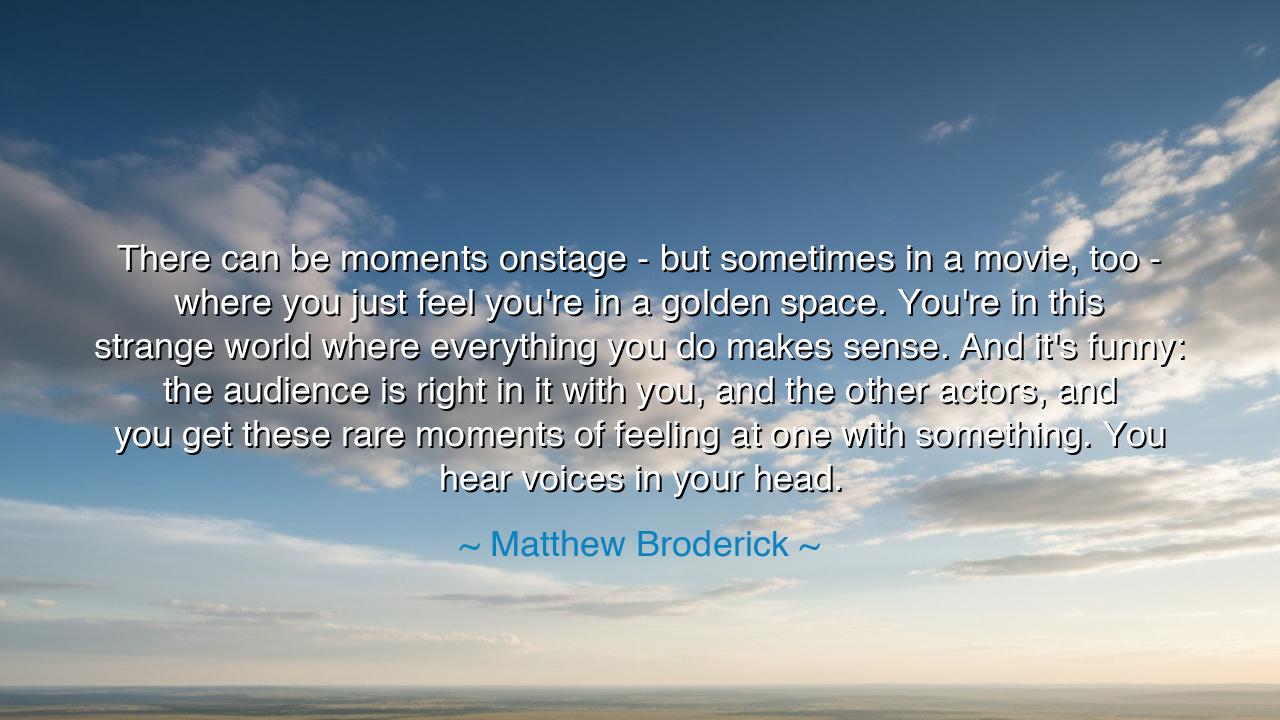
There can be moments onstage - but sometimes in a movie, too -
There can be moments onstage - but sometimes in a movie, too - where you just feel you're in a golden space. You're in this strange world where everything you do makes sense. And it's funny: the audience is right in it with you, and the other actors, and you get these rare moments of feeling at one with something. You hear voices in your head.






The words, “There can be moments onstage—but sometimes in a movie, too—where you just feel you’re in a golden space. You’re in this strange world where everything you do makes sense. And it’s funny: the audience is right in it with you, and the other actors, and you get these rare moments of feeling at one with something. You hear voices in your head,” were spoken by Matthew Broderick, an actor whose craft has bridged the stage and the screen, comedy and tragedy, youth and maturity. Beneath these reflective words lies a mystery known to artists, musicians, writers, and all who have ever touched the divine through creation: that fleeting state where effort dissolves and something greater takes hold—the ancient and eternal golden space of harmony between mind, spirit, and art.
In the style of the ancients, we may say that Broderick speaks of divine possession, what the Greeks once called enthousiasmos, the condition of being filled with the presence of the gods. In those rare moments of performance, when he feels “at one with something,” the artist ceases to act of his own will and becomes instead an instrument through which truth speaks. The “voices in your head” he describes are not madness, but the murmurs of inspiration, the guiding whispers of the muse. Such moments are sacred—they cannot be forced or predicted. They are gifts, brief and blinding, that remind us of the connection between human craft and cosmic order.
This “golden space,” as Broderick names it, is not confined to the stage or camera. It is the state every soul seeks in its own art—be it music, teaching, healing, writing, or living. It is the rare moment when everything aligns, when the self vanishes and all that remains is the act itself, pure and alive. The ancients would have called it kairos—the divine instant where time bends and eternity brushes against the mortal. Athletes feel it when movement becomes effortless, poets when words flow as if dictated from beyond, lovers when they lose all sense of separateness. In this state, there is no striving, no doubt—only being.
We might recall the story of Michelangelo, who spoke of his sculptures as if they already existed within the marble, waiting only for his hand to set them free. When asked how he created David, he answered simply, “I saw the angel in the marble and carved until I set him free.” That is the same oneness Broderick describes—the artist no longer inventing, but revealing; no longer pushing, but listening. The “voices in your head” are not distractions but the deeper intelligence of the spirit, speaking through intuition, rhythm, and grace. In that moment, the artist becomes both creator and creation, both instrument and song.
There is also humility in Broderick’s observation. He calls these moments “rare,” acknowledging that they are not his to command. This humility is the mark of the true artist, for the wise know that inspiration cannot be owned—only welcomed. One may prepare through discipline, practice, and courage, but the spark comes when it will. The musician must tune the instrument, the actor must learn his lines, the writer must face the page—but the flame, when it appears, is a visitation. And yet, paradoxically, it comes most often to those who are ready—to those who labor not for glory, but for truth.
Broderick also touches upon a sacred communion between artist and audience: “The audience is right in it with you,” he says. This unity is the completion of the circle. In the ancient theatre of Dionysus, the boundary between actor and spectator was porous—the audience was not merely watching, but participating in the divine ritual of storytelling. The laughter, the tears, the gasps—these were not responses but echoes, each soul resonating with the performer’s truth. When Broderick feels “at one with something,” it is not isolation he describes, but union—a joining of hearts in the timeless act of shared creation.
So, my child, take this teaching to heart: seek your own golden space. Prepare your craft with diligence, your mind with patience, and your heart with faith, but do not demand the moment of grace. It will come when you are open, when your will gives way to wonder. When it does, surrender to it fully. Forget yourself. Let the “voices in your head” speak, for they are the murmurs of truth that rise when the noise of doubt has fallen silent.
And remember: the golden space is not reserved for actors and artists—it belongs to every human soul who gives their whole self to the present moment. Whether you are speaking to a friend, planting a tree, or creating something beautiful, there will come a time when everything you do makes sense, and you will feel yourself at one with life itself. Treasure these moments, for they are glimpses of eternity. They remind us that we are not merely players upon the stage of the world—we are the play itself, unfolding under the gaze of the divine.






AAdministratorAdministrator
Welcome, honored guests. Please leave a comment, we will respond soon